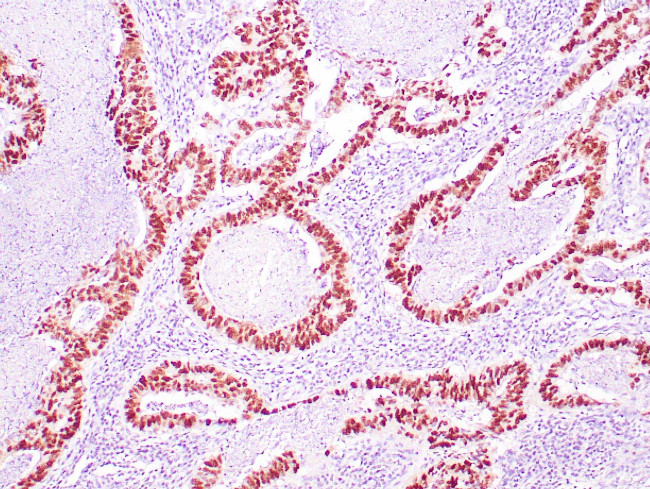Specifications:
| Application | molecular biology | ||
| Storage Temperature | 2-8°C | ||
| Product Type | Primary Antibodies | Forms | Liquid |
| Product Brand | Thermo Fisher Scientific™ | ||
| Product Grade | Molecular Biology | ||
The Zeta p53 Monoclonal Antibody (DO-7) is a mouse monoclonal antibody (IgG2b, kappa) designed for the detection of human p53 protein in formalin-fixed, paraffin-embedded (FFPE) tissue sections by immunohistochemistry (IHC-P). Recognizing both wild-type and mutant forms of p53, this antibody is widely used as a research tool for studying tumor suppressor pathways, apoptosis, and cancer-related mutations.
The DO-7 clone is among the most validated and referenced p53 antibodies in oncology research and is recommended for qualitative immunohistochemical staining in manual laboratory workflows.
Key Features & Benefits
- Clone DO-7 – Recognizes both wild-type and mutant human p53 protein.
- Validated for IHC-P – Suitable for use with FFPE tissue sections following epitope retrieval.
- Flexible Formats – Available as concentrated (0.1–1 mL) or pre-diluted (7 mL) formulations.
- High Specificity – Monoclonal antibody raised against recombinant human wild-type p53 protein expressed in E. coli.
- Reliable Performance – Widely used for tumor marker studies in cancer research.
- Internal & External Controls – Recommended use with positive and negative control tissues for quality assurance.
Available Formats
| Catalog Number | Size | Format |
|---|---|---|
| Z2029ML | 1.0 mL | Concentrate |
| Z2029MS | 0.5 mL | Concentrate |
| Z2029MP | 7.0 mL | Pre-dilute (Ready-to-use) |
Applications
-
Immunohistochemistry (Paraffin) (IHC-P)
- Recommended dilution: Ready-to-use (150–200 µL per test)
- Typical staining: Nuclear localization in carcinoma cells
- Example: Human breast carcinoma showing nuclear staining with DO-7
Product Specifications
| Attribute | Details |
|---|---|
| Target Protein | p53 (tumor suppressor protein) |
| Species Reactivity | Human |
| Host/Isotype | Mouse / IgG2b, kappa |
| Clone | DO-7 |
| Class | Monoclonal |
| Immunogen | Recombinant human wild-type p53 protein (expressed in E. coli) |
| Conjugate | Unconjugated |
| Form | Liquid |
| Purification | Protein A affinity |
| Storage Buffer | Tris with NP-40, BSA |
| Preservative | <0.1% sodium azide |
| Storage Conditions | 4°C |
| Shipping Conditions | Ambient (domestic), Wet ice (international) |
| Intended Use | For research use only |
Target Information – p53
The p53 tumor suppressor protein is a key transcription factor activated by cellular stress. It regulates cell cycle arrest and apoptosis in response to DNA damage, oxidative stress, and oncogene activation. p53 activates genes such as p21waf1, mediating G1 and G2/M checkpoints, and helps prevent the proliferation of damaged cells.
- Structure: N-terminal transactivation domain, central DNA-binding domain, oligomerization domain, and C-terminal regulatory domain.
- Biological Role: Tumor suppression, DNA repair, apoptosis, senescence, and cellular stress response.
- Disease Relevance: Mutations in TP53 are found in a wide range of cancers (breast, colon, lung, bladder, ovarian, melanoma, etc.), leading to loss of tumor suppressor function. Germline mutations are associated with Li-Fraumeni syndrome.
- Research Applications: Oncology, cancer diagnostics research, cell cycle studies, apoptosis research, and biomarker analysis.
Controls & Quality Assurance
- Positive Tissue Control: Serous carcinoma (recommended) or other carcinoma tissues known to express p53.
- Negative Controls: Internal tissue components lacking p53 expression, or external negative control tissues.
- Quality Note: Positive and negative controls must be included in every staining run to validate results.
The Zeta p53 Monoclonal Antibody (DO-7) is a trusted and widely cited antibody for detecting p53 in FFPE tissue sections via IHC-P. With its strong specificity, reliable nuclear staining patterns, and availability in multiple formats, it is a key reagent for researchers studying tumor biology, cancer progression, and apoptosis pathways.
- Pack Size: 0.5 mL, Concentrate 1 mL, Concentrate 7 mL, pre-diluted




 0
0
